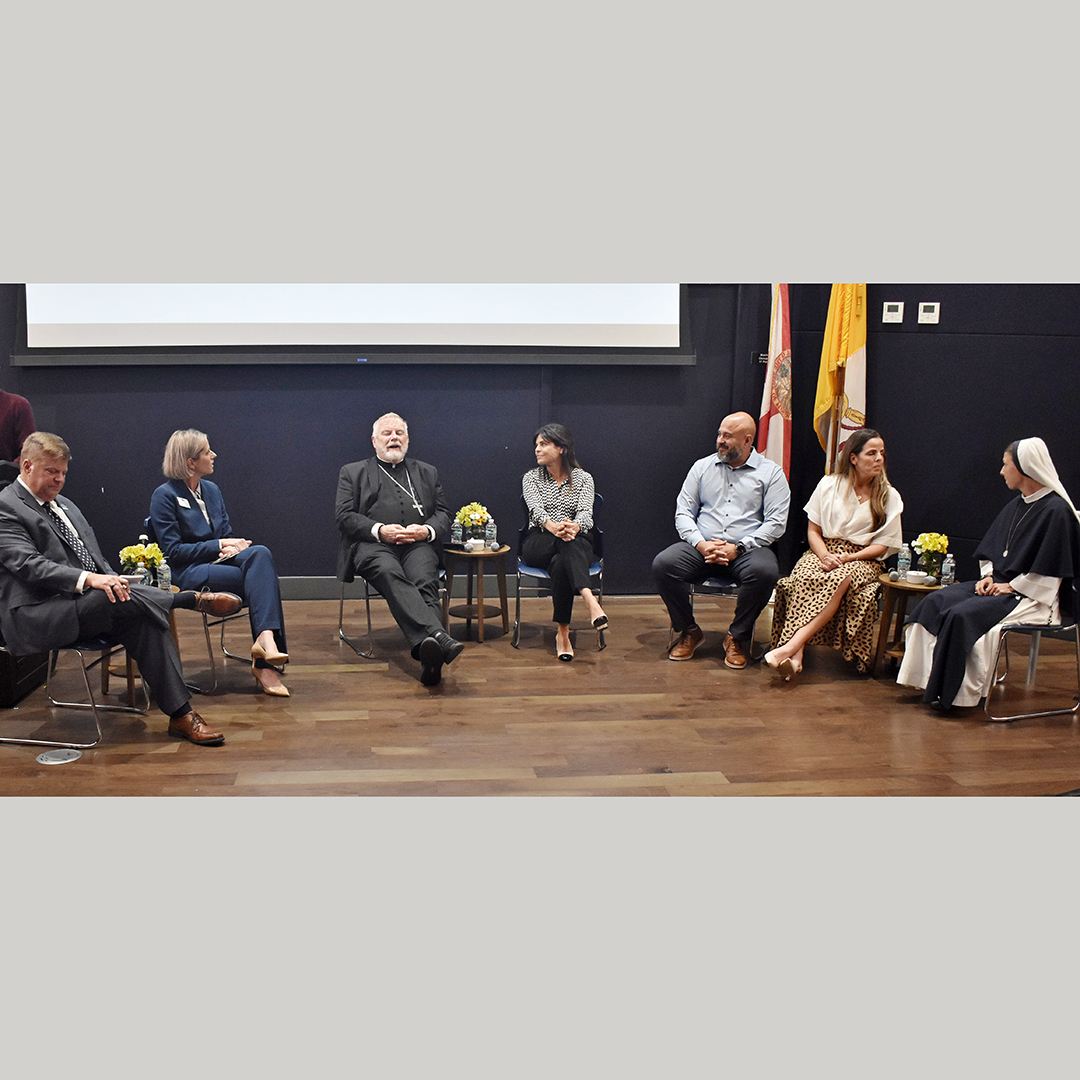By Jim Davis - Florida Catholic
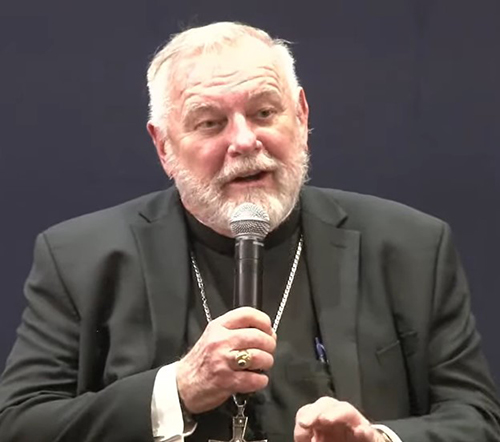
Photographer: COURTESY
“It would make Florida a harsher place,” Archbishop Thomas Wenski warns of the proposed Florida Amendment 4, during a panel discussion Sept. 26, 2024, at St. Thomas University in Miami Gardens.
MIAMI GARDENS | If Florida Amendment 4 is passed, the state will become a “mecca for abortions,” according to Archbishop Thomas Wenski.
The proposed amendment will bring “death and destruction,” according to Dr. Grazie Pozo Christie, a leading pro-life physician from South Florida.
They were among five panelists Sept. 26, 2024, at St. Thomas University, sounding alarms on the consequences if the change to the state constitution is passed.
The meeting drew about dozens of parishioners, activists and students to the event, held at STU’s Gus Machado Auditorium. Others watched via livestream on the archdiocesan website.
The panelists said the amendment, scheduled for a ballot in November, uses deceptive language to lift several restrictions to abortion, such as parental consent and the presence of a doctor.
“It would make Florida a harsher place,” Archbishop Wenski said. “It would harden doctors and people who support it. And it will make Florida into a mecca for abortions, for people from other states and from South America.”
The wording of Amendment 4 is starkly simple. It would allow abortions “before viability” (when a fetus could survive outside the womb) or to protect a patient’s health, “as determined by the patient’s healthcare provider.”
VAGUE, DECEPTIVE
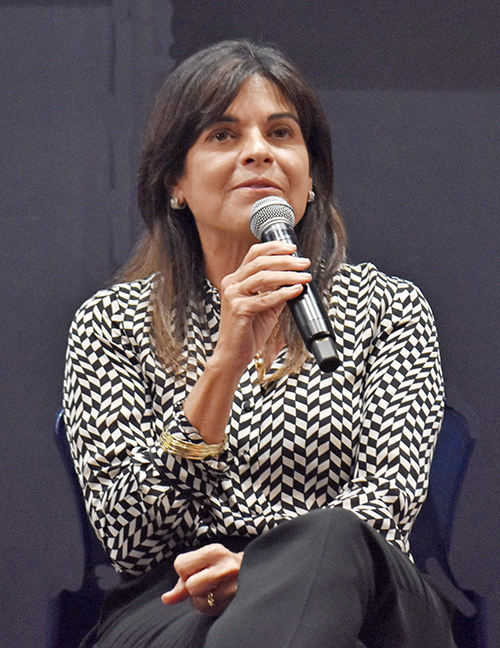
Photographer: JIM DAVIS | FC
“We hear the word ‘choice, choice, choice,’ like a mantra," says Dr. Grazie Pozo Christie during a panel discussion on the proposed Florida Amendment 4, held Sept. 26, 2024 at St. Thomas University. "But abortion is the opposite - it’s a last choice."
For that reason, the amendment is vague and deceptive, said Dr. Christie, a radiologist and senior fellow of the Catholic Association. Among her criticisms:
• Who qualifies as a “healthcare provider” – a doctor or someone else in the office?
• If a patient’s health could include “social or emotional or economic health,” not just physical risks.
• Why parental “notification,” but not parental consent, is required if a minor is having the abortion.
“Amendment 4 is a Trojan horse, and inside it is death and destruction,” Christie concluded. “We hear the word ‘choice, choice, choice,’ like a mantra. But abortion is the opposite – it’s a last choice. No one wants a painful medical procedure.”
She noted also that the archdiocese, through its three Pregnancy Help Centers, provides a range of assistance before and after birth, including ultrasounds, baby clothes and formula, even counseling for mothers and fathers.
It’s a stark difference from the pro-choice approach, Archbishop Wenski said. “We care about children before and after. And we do it without a plan to make money.”
Florida’s eight Catholic bishops came out early against Amendment 4, issuing a joint protest on April 9. Their one-page document says it would allow all abortions, remove the need for parental consent, and even put women at risk.
“The dignity of the human person is the foundation of a moral vision of society,” the bishops stated. “The threat of abortion remains our pre-eminent policy priority.”
They asked Catholics to pray and stand against the abortion amendment, invoking Mary as “Mother of the Family” and St. Joseph as “Protector of the Unborn.”
INFINITE VALUE
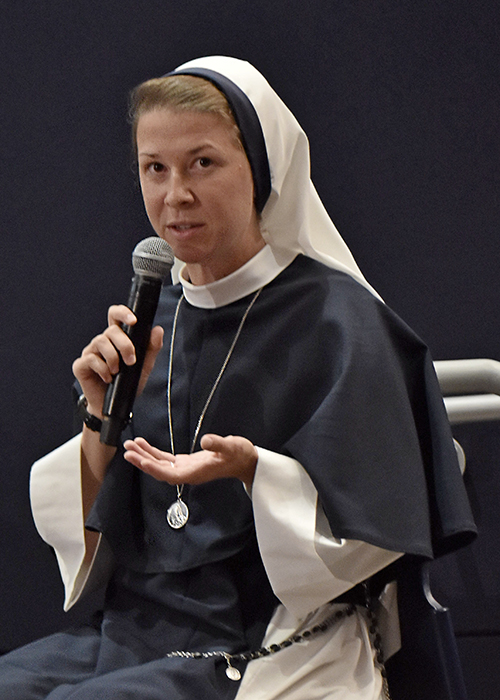
Photographer: JIM DAVIS | FC
“We want every woman to know, ‘God chose you for this baby,' " Sister Ann Immaculee says during a panel discussion on the proposed Florida Amendment 4, held Sept. 26, 2024 at St. Thomas University.
The audience at the panel also heard from Sister Ann Immaculeé, one of three Sisters of Life who attended. She told of the charism of the order, founded by the late Cardinal John O'Connor of New York, to enhance the sacredness of human life.
Sister Ann said the order, founded in 1991, specializes in aid and comfort to women anguished by pressure to abort their unborn children. They let the women talk at length – to “empty their bucket,” she said – then offer reassurance and encouragement.
“We say, ‘God loves you, and you have infinite value,’” Sister Ann said. “We want every woman to know, ‘God chose you for this baby. And your love is good and necessary for this child.’”
Panelists John and Christine Mora told of their daughter Vida Elyse. The child was diagnosed in December 2015 with a genetic condition called Trisomy 13.
“Like a lightning bolt” is how the diagnosis felt, John confessed. Vida’s doctor was supportive, but many medical sources said such children often die in the womb. John confessed that he considered aborting her, but his wife disagreed.
“When a child is sick at two or three months, the parents fight for them,” Christine Mora said. “Why can't they do that before birth?”
Vida lived only a month, but her story prompted people to pray the rosary and attend church. Some also shared their own stories about childbirth.
She even “brought me to my knees and to the cross,” John said. “I had to ask her for forgiveness, that I didn’t fight for her from the beginning. She accomplished in 31 days what many people don’t in a lifetime.”
IMAGE OF GOD
During an audience Q&A, Archbishop Wenski was asked how he would answer someone who believes Catholics should stay out of politics. He vehemently replied that religious people are “not second-class citizens.”
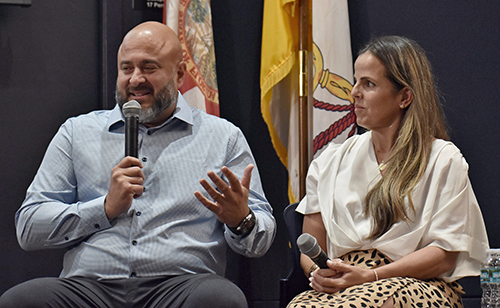
Photographer: JIM DAVIS | FC
John and Christine Mora tell how the brief life of their daughter Vida Elyse affected them during a panel discussion on the proposed Florida Amendment 4, held Sept. 26, 2024 at St. Thomas University.
“As Catholic citizens, we have a right to participate in the political process,” he continued. “Hopefully, we can convince others of our position. That’s democracy in action.”
Another question: What’s the role of faith in all of this? Archbishop Wenski mentioned the belief that all humans are made in the image of God, with “value and dignity.”
“When you define a human being as a problem, you find ways to eliminate them, whether they're a child or the elderly,” he said. “Our faith tells us a lot about God, but also a lot about us.”
After the event, audience members gave him high marks for its appraisal of Amendment 4.
“We should be going against taking a person’s life for no reason,” said Alek Jurado, 16, a student at the Belen Jesuit Preparatory School in Miami.
Dr. Felipe Vizcarrondo, a member of Florida Physicians Against Amendment 4, needed no convincing. “The amendment (4) is anti-life. If passed, it will make abortion legal until birth.”
Sister Ann’s comments were the best part of the panel for some in the audience.
“I liked her talking about supporting individuals, to make them feel loved,” said Nicholas Ruzza, studying at STU for a master’s degree in cybersecurity. “When you're loved, you have love to give to a child.”
Theology freshman Rowan Vollmer was most touched by the Moras’ story. “I wasn't expecting the vulnerability. It’s a reminder that this is not just about laws on paper. It affects everyday people who are making decisions. It’s up to us as to help them as Catholics.”
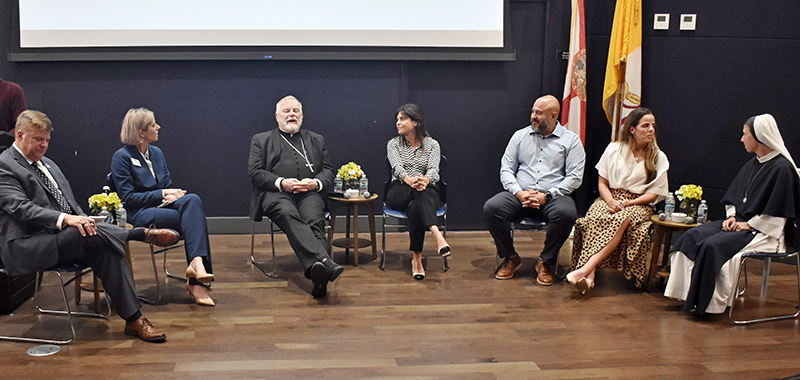
Photographer: JIM DAVIS | FC
A panel discussion consisting of five panelists met at St. Thomas University on September 26, 2024, to discuss Florida's proposed Amendment 4. From left, are the two moderators, Scott Gale, chair of political science at STU, and Ashlee Rzyczycki, Faculty Senate chair in the STU College of Business; Archbishop Thomas Wenski of Miami; Dr. Grazie Pozo Christie of The Catholic Association; John and Christine Mora; and Sister Ann Immaculee, a member of the Sisters of Life.
